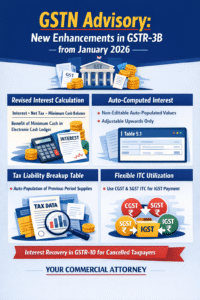As the financial year 2024-25 comes to an end, businesses need to complete several crucial GST compliances to ensure a smooth transition into the next financial year. Missing these deadlines can lead to penalties and compliance issues. Here’s a simplified checklist of the key GST tasks to be completed before March 31, 2025:
1. Submit Letter of Undertaking (LUT)
If your business deals with zero-rated supplies (such as exports or supplies to SEZs) without paying IGST, you must submit a fresh Letter of Undertaking (LUT) in Form RFD-11 for the new financial year 2025-26. This must be done before March 31, 2025, to continue exporting goods/services without paying IGST.
2. Opt for the Composition Scheme
Businesses eligible for the Composition Scheme (turnover up to ₹1.5 crore for goods and ₹50 lakh for services) must file Form GST CMP-02 before March 31, 2025, to continue under the scheme for the next financial year. The Composition Scheme simplifies GST compliance by allowing businesses to pay tax at a fixed percentage of turnover instead of on each transaction.
3. Implement a New Invoice Series
Starting from April 1, 2025, businesses should implement a new invoice series for all tax invoices, credit notes, debit notes, and bills of supply. This helps in easy tracking and compliance during audits.
4. Assess E-Invoice Applicability
Businesses with a turnover exceeding ₹5 crore in any financial year are required to generate e-invoices for B2B transactions. Check whether your business crosses this threshold and ensure e-invoice compliance from April 1, 2025.
5. Issue Credit Notes on Time
If you need to issue credit notes for sales returns, discounts, or adjustments for supplies made in FY 2024-25, these must be issued before November 30, 2025 (the due date for filing the annual return).
6. Decide Tax Treatment for Goods Transport Agencies (GTA)
If your business avails services from Goods Transport Agencies (GTA), obtain a declaration from them confirming whether they will charge GST under forward charge or opt for reverse charge mechanism (RCM). This will ensure proper tax treatment and avoid mismatches in GST filings.
7. Choose the QRMP Scheme for the Next Financial Year
The Quarterly Return Monthly Payment (QRMP) Scheme is available for businesses with a turnover of up to ₹5 crore. Under this scheme, businesses can:
- File GSTR-1 and GSTR-3B quarterly instead of monthly.
- Pay GST on a monthly basis using a fixed amount or actual tax liability method.
- Reduce compliance burden by limiting the number of filings to 8 returns per year instead of 24.
If a registered person wants to opt for the QRMP scheme for the financial year 2025-26, they must select the option before March 31, 2025 in the GST portal.
8. Utilize the GST Amnesty Scheme 2025
The GST Amnesty Scheme 2025 provides relief by waiving penalties and reducing interest for taxpayers with pending GST returns from FY 2017-18 to 2019-20. To benefit from this scheme, businesses must:
- Pay the pending tax dues before March 31, 2025.
- Submit the required forms before June 30, 2025.
9. Reconcile Financial Records for GST Accuracy
Ensure that your books of accounts are reconciled with:
- GSTR-1 (outward supply details)
- GSTR-3B (tax payment returns)
- ITC register (input tax credit claims)
- Income tax returns
This helps in identifying any mismatches and avoiding unnecessary tax liabilities or notices from the GST department.
10. Comply with Rule 96A for Exporters
If you export goods/services without paying IGST under LUT, you must ensure that:
- The export is completed within the stipulated time.
- Payment is received in convertible foreign exchange or Indian rupees (where permitted).
Failing to comply with Rule 96A of CGST Rules, 2017 may result in your exports being treated as taxable supplies, attracting GST liability.
Conclusion
By completing these 10 important GST compliances before March 31, 2025, businesses can ensure smooth operations, avoid penalties, and stay compliant with GST laws. Make sure to review your records, opt for relevant schemes, and submit necessary declarations on time to avoid last-minute hassles.
Stay updated and ensure timely GST compliance for a stress-free financial year ahead! 🚀




Add comment